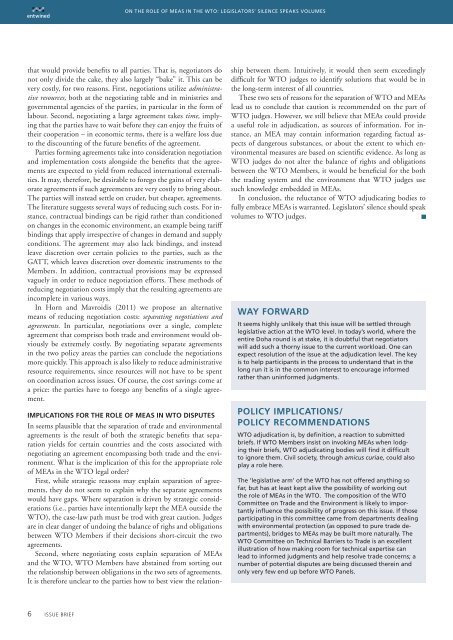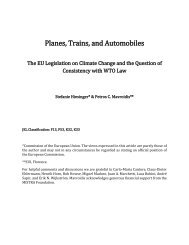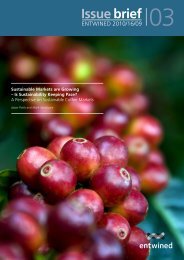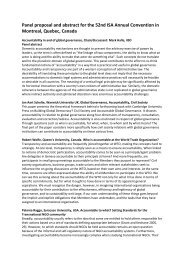Issue brief - Entwined
Issue brief - Entwined
Issue brief - Entwined
You also want an ePaper? Increase the reach of your titles
YUMPU automatically turns print PDFs into web optimized ePapers that Google loves.
ON THE ROLE OF MEAS IN THE WTO: LEGISLATORS’ SILENCE SPEAKS VOLUMES<br />
that would provide benefits to all parties. That is, negotiators do<br />
not only divide the cake, they also largely “bake” it. This can be<br />
very costly, for two reasons. First, negotiations utilize administrative<br />
resources, both at the negotiating table and in ministries and<br />
governmental agencies of the parties, in particular in the form of<br />
labour. Second, negotiating a large agreement takes time, implying<br />
that the parties have to wait before they can enjoy the fruits of<br />
their cooperation – in economic terms, there is a welfare loss due<br />
to the discounting of the future benefits of the agreement.<br />
Parties forming agreements take into consideration negotiation<br />
and implementation costs alongside the benefits that the agreements<br />
are expected to yield from reduced international externalities.<br />
It may, therefore, be desirable to forego the gains of very elaborate<br />
agreements if such agreements are very costly to bring about.<br />
The parties will instead settle on cruder, but cheaper, agreements.<br />
The literature suggests several ways of reducing such costs. For instance,<br />
contractual bindings can be rigid rather than conditioned<br />
on changes in the economic environment, an example being tariff<br />
bindings that apply irrespective of changes in demand and supply<br />
conditions. The agreement may also lack bindings, and instead<br />
leave discretion over certain policies to the parties, such as the<br />
GATT, which leaves discretion over domestic instruments to the<br />
Members. In addition, contractual provisions may be expressed<br />
vaguely in order to reduce negotiation efforts. These methods of<br />
reducing negotiation costs imply that the resulting agreements are<br />
incomplete in various ways.<br />
In Horn and Mavroidis (2011) we propose an alternative<br />
means of reducing negotiation costs: separating negotiations and<br />
agreements. In particular, negotiations over a single, complete<br />
agreement that comprises both trade and environment would obviously<br />
be extremely costly. By negotiating separate agreements<br />
in the two policy areas the parties can conclude the negotiations<br />
more quickly. This approach is also likely to reduce administrative<br />
resource requirements, since resources will not have to be spent<br />
on coordination across issues. Of course, the cost savings come at<br />
a price: the parties have to forego any benefits of a single agreement.<br />
IMPLICATIONS FOR THE ROLE OF MEAS IN WTO DISPUTES<br />
In seems plausible that the separation of trade and environmental<br />
agreements is the result of both the strategic benefits that separation<br />
yields for certain countries and the costs associated with<br />
negotiating an agreement encompassing both trade and the environment.<br />
What is the implication of this for the appropriate role<br />
of MEAs in the WTO legal order?<br />
First, while strategic reasons may explain separation of agreements,<br />
they do not seem to explain why the separate agreements<br />
would have gaps. Where separation is driven by strategic considerations<br />
(i.e., parties have intentionally kept the MEA outside the<br />
WTO), the case-law path must be trod with great caution. Judges<br />
are in clear danger of undoing the balance of righs and obligations<br />
between WTO Members if their decisions short-circuit the two<br />
agreements.<br />
Second, where negotiating costs explain separation of MEAs<br />
and the WTO, WTO Members have abstained from sorting out<br />
the relationship between obligations in the two sets of agreements.<br />
It is therefore unclear to the parties how to best view the relationship<br />
between them. Intuitively, it would then seem exceedingly<br />
difficult for WTO judges to identify solutions that would be in<br />
the long-term interest of all countries.<br />
These two sets of reasons for the separation of WTO and MEAs<br />
lead us to conclude that caution is recommended on the part of<br />
WTO judges. However, we still believe that MEAs could provide<br />
a useful role in adjudication, as sources of information. For instance,<br />
an MEA may contain information regarding factual aspects<br />
of dangerous substances, or about the extent to which environmental<br />
measures are based on scientific evidence. As long as<br />
WTO judges do not alter the balance of rights and obligations<br />
between the WTO Members, it would be beneficial for the both<br />
the trading system and the environment that WTO judges use<br />
such knowledge embedded in MEAs.<br />
In conclusion, the reluctance of WTO adjudicating bodies to<br />
fully embrace MEAs is warranted. Legislators’ silence should speak<br />
volumes to WTO judges.<br />
WAY FORWARD<br />
It seems highly unlikely that this issue will be settled through<br />
legislative action at the WTO level. In today’s world, where the<br />
entire Doha round is at stake, it is doubtful that negotiators<br />
will add such a thorny issue to the current workload. One can<br />
expect resolution of the issue at the adjudication level. The key<br />
is to help participants in the process to understand that in the<br />
long run it is in the common interest to encourage informed<br />
rather than uninformed judgments.<br />
POLICY IMPLICATIONS/<br />
POLICY RECOMMENDATIONS<br />
WTO adjudication is, by definition, a reaction to submitted<br />
<strong>brief</strong>s. If WTO Members insist on invoking MEAs when lodging<br />
their <strong>brief</strong>s, WTO adjudicating bodies will find it difficult<br />
to ignore them. Civil society, through amicus curiae, could also<br />
play a role here.<br />
The ‘legislative arm’ of the WTO has not offered anything so<br />
far, but has at least kept alive the possibility of working out<br />
the role of MEAs in the WTO. The composition of the WTO<br />
Committee on Trade and the Environment is likely to importantly<br />
influence the possibility of progress on this issue. If those<br />
participating in this committee came from departments dealing<br />
with environmental protection (as opposed to pure trade departments),<br />
bridges to MEAs may be built more naturally. The<br />
WTO Committee on Technical Barriers to Trade is an excellent<br />
illustration of how making room for technical expertise can<br />
lead to informed judgments and help resolve trade concerns; a<br />
number of potential disputes are being discussed therein and<br />
only very few end up before WTO Panels.<br />
6 ISSUE BRIEF





